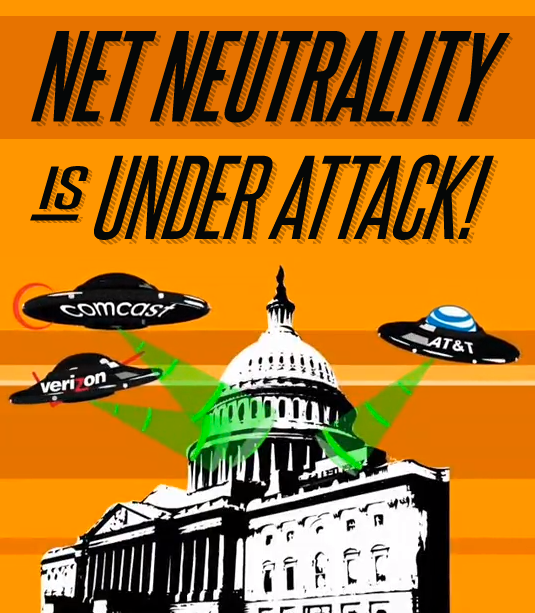
The Federal Communications Commission today announced its plan to deregulate the broadband industry and eliminate net neutrality rules, setting up a December 14 vote to finalize the repeal.
As expected, FCC Chairman Ajit Pai is proposing to reverse the commission's classification of home and mobile ISPs as common carriers, eliminating the legal justification for the net neutrality rules and numerous other consumer protections. The Republican-controlled FCC is likely to vote 3-2 along party lines in favor of Pai's plan at its regular monthly meeting in December, ignoring Internet users who voiced widespread support for net neutrality rules.
Pai's decision is a big win for cable companies, telcos, and mobile carriers that will no longer face regulation of their broadband businesses under Title II of the Communications Act. Pai ignored numerous calls from consumer advocates, website operators, and Internet users who urged the FCC to preserve the rules that force Internet providers to treat all Web content fairly.
Pai was on the losing end of a 3-2 vote in 2015 that imposed Title II regulations, including net neutrality rules that outlaw blocking, throttling, and paid prioritization. He started the repeal process shortly after President Trump appointed him chairman this year.
Today, Pai said that he intends to eliminate the core net neutrality rules while preserving some requirements that ISPs inform consumers about their network management practices.
"Under my proposal, the federal government will stop micromanaging the Internet," Pai said in a statement today. "Instead, the FCC would simply require Internet service providers to be transparent about their practices so that consumers can buy the service plan that's best for them and entrepreneurs and other small businesses can have the technical information they need to innovate."
In May, Pai's FCC issued a Notice of Proposed Rulemaking (NPRM) that proposed overturning the 2015 order and sought public comments. The FCC received 22 million comments, which were dominated by spam and form letters. But Internet users opposed Pai's plan en masse; one analysis found that 98.5 percent of unique comments were against Pai's repeal plan.
Pai claims the rules have forced Internet providers to decrease investment in their networks, despite evidence to the contrary.
Pai is also ignoring a call from Democratic Commissioner Jessica Rosenworcel, who said the FCC should hold public hearings across the country before altering net neutrality rules. The public comment process has been marred by spam bots, impersonation, and what the FCC called a DDoS attack on the comment system, she noted. The FCC should thus get the opinions of Americans in person before proceeding, she said.
Pai circulated his proposal to fellow commissioners today and said he will release the draft order publicly tomorrow.
“Restoring Internet freedom”—or destroying it?
Pai titled his proposal, "Restoring Internet Freedom." Democratic Commissioner Mignon Clyburn called it the "Destroying Internet Freedom" plan, saying it will "dismantle net neutrality as we know it by giving the green light to our nation’s largest broadband providers to engage in anti-consumer practices, including blocking, slowing down traffic, and paid prioritization of online applications and services."
Pai's plan "is simply a giveaway to the nation’s largest communications companies, at the expense of consumers and innovation," Clyburn said. "It is not only bad public policy but is legally suspect. I hope my colleagues will see the light, and put these drafts where they belong: in the trash heap.”
Verizon and other ISPs have claimed that they support net neutrality rules and that they merely want them to be imposed "on a different legal footing," without Title II. But Pai is not trying to preserve any of the three core rules against blocking, throttling, and paid prioritization. Pai has previously suggested that throttling of online services might somehow benefit consumers.
After the vote, expect a lawsuit
After next month's vote, net neutrality supporters will likely sue the FCC to get the rules back on the books. They could argue that the FCC used flawed reasoning or an improper decision-making process, but courts have generally given deference to FCC decisions on whether to impose common carrier regulations. Former Chairman Tom Wheeler faced a challenge from broadband providers after his 2015 net neutrality decision, but the rules were upheld in court.
While Pai can't stop a future Democratic chair from putting the rules back on the books, Congress could write a law that prevents strict regulation of ISPs.
Today, Pai said that the FCC's former Democratic majority "bowed to pressure from President Obama. On a party-line vote, it imposed heavy-handed, utility-style regulations upon the Internet."
Pai claimed again that this decision "depressed investment in building and expanding broadband networks and deterred innovation."
"Today, I have shared with my colleagues a draft order that would abandon this failed approach and return to the longstanding consensus that served consumers well for decades," Pai said.
ISPs will get to choose whether to uphold net neutrality
Pai's decision to eliminate the Title II classification of ISPs will return some authority to the Federal Trade Commission, which is not allowed to regulate common carriers.
"As a result of my proposal, the Federal Trade Commission (FTC) will once again be able to police ISPs, protect consumers, and promote competition, just as it did before 2015," Pai said. "Notably, my proposal will put the federal government's most experienced privacy cop, the FTC, back on the beat to protect consumers' online privacy." Previously, Congress and President Trump repealed the FCC's consumer broadband privacy regulations, with Pai's support.
Unlike the FCC, the FTC isn't able to create hard-and-fast rules that ISPs must follow, as we've previously written. But the FTC does have authority to prevent deceptive and unfair practices so that the agency can force companies to live up to the promises they place in their terms of service. If an ISP promises a neutral network and then fails to deliver, the FTC can then step in.
But under this model, ISPs will be able to decide for themselves whether to follow net neutrality principles.
reader comments
380